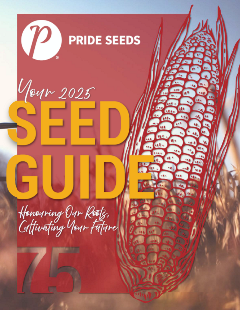Browse our selection of products below
___________________________________________________________________________________________________________________________________________

2024-2025 PRIDE Seeds Product GuideYou can find all of our products on the website, including supporting performance data and create your own personalized guide called My Guide. You can also download the digital version of our printed product guide which includes product comparison charts. |
Enhance your knowledge and stay ahead with PRIDE SEEDS Corn and Soybean School videos.
SHOP THE PRIDE SEEDS E-STORE
-7.png?sfvrsn=87920db3_3)
STAY UP-TO-DATE WITH PRIDE SEEDS LATEST BLOGS, NEWS AND ARTICLES
Cover Crops – Why Plant Them?
While it might be tempting to skip the process of planting a cover crop, there are some very compelling reasons not to. Cover crops can reduce the soil erosion caused by wind and rain, as well as alleviate soil compaction. As well, cover crops aid in weed suppression, pest reduction and also help sequester carbon, which improves soil health.
After the cash crop has been removed, cover crops help nourish the soil biology. They help bridge the gap between harvest and planting and give the soil a continued energy source.
Once the decision has been made to plant a cover crop, there are several things to consider. Will the grower be planting a single cover crop (monoculture) or a mixture (polyculture)? It really comes down to what best meets the needs of the producer and the soil as different cover crop’s root structures or growing habits lend themselves to different goals.
A basic rule of thumb is to select a cover crop from each group: legumes, warm season grass, cool season grass and brassica family. By selecting one of each, you spread your risk as well as take advantage of the varying benefits of each group.
TILLAGE RADISH
- Alleviates compaction
- Nitrogen scavenger
- Suppresses weeds
- Does not over-winter
CEREAL RYE
- Fibrous root structure provides amazing erosion control
- Over-winters
- Nutrient scavenger
- Suppresses weeds
- Produces large amounts of biomass in the spring
OATS
- Great nitrogen scavenger
- Winter kills
- Lends itself to grazing/harvest for livestock
PEAS
- Many varieties available, with varying winter hardiness
- Fixes nitrogen
- Works well in a mixture of grasses
- Makes great feed or late season pasture
- Produces large amounts of biomass if planted early enough
It is also important to know whether the cover crop is frost sensitive and to know your own area’s frost-free date. Crops like buckwheat, sunflowers and phacelia are more frost-sensitive that some others. Caution is advised if planting later, after corn silage for example.
The carbon to nitrogen ratio of the mix is also an important factor. As the C:N ratio increases, the release of nitrogen to the subsequent cash crop is hindered. If the C:N ratio gets too high, the soil will have to provide nitrogen to break down the extra carbon in the mix.
While that might be a challenge in the short-term, in the long-term it will help sequester carbon in the soil as well as build organic matter.
TAKE PRIDE IN YOUR INBOX
Expert advice, news and information
THE PRIDE SEEDS ADVANTAGE
Farming is one of the most demanding industries in the world, subject to a variety of factors such as time, weather, and global pressures. You know this every time you look out the window and think about the field in front of you. Growers and dealers deserve an advantage: The PRIDE Seed Advantage.
LEARN MORETHE PRIDE SEEDS ADVANTAGE
Every year PRIDE Seeds works hard to produce leading-edge products that enable success where it matters most, on your farm. Our dedicated team strives to provide sales expertise, agronomy support, quality production, and service tailored to meet your needs.
LEARN MORE

Leave a commentOrder by
Newest on top Oldest on top